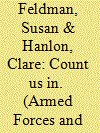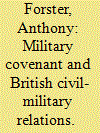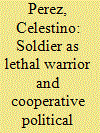|
|
|
Sort Order |
|
|
|
Items / Page
|
|
|
|
|
|
|
| Srl | Item |
| 1 |
ID:
112376


|
|
|
|
|
| Publication |
2012.
|
| Summary/Abstract |
This study introduces the new concept of targeted partnership, which encourages robust dialogue between military officers and policy makers to create and implement effective military strategy such as counterinsurgency. Targeted partnership is a distillate form of concordance theory or agreement involving reciprocity between the military, political elites, and society for a limited period of time to accomplish a very specific objective. Targeted partnership may involve the temporary co-mingling of military, political, and societal boundaries even when the broader institutional and cultural relationship between military and society may be one of separation. In other words, separation and integration may exist at the same time for very specific reasons central to a nation's foreign policy. Targeted partnership is a practical extension of concordance theory that enables the military to have effective interactive dialogue with policy makers to explore critical military strategies, such as counterinsurgency, while considering the cultural and institutional contexts of foreign nations.
|
|
|
|
|
|
|
|
|
|
|
|
|
|
|
|
| 2 |
ID:
112371


|
|
|
|
|
| Publication |
2012.
|
| Summary/Abstract |
This article reports the findings of a qualitative study that explores the linkages between female veterans' experiences in warlike, peacemaking, peacekeeping, and humanitarian operations and their perceived health support needs over the long term. It is based on the experiences of Australian female veterans who had deployed overseas. The findings suggest that a woman's emotional well-being over the long term and ability to fully reintegrate back into civilian life after deployment is diminished when there is a significant disparity between her expectations of deployment and her actual operational experiences. A major implication from these findings is that civilian health and support services should develop a better understanding of the distinctive needs of the female veteran population and develop stronger linkages with the military community so as to facilitate ongoing deployment-related support for female veterans.
|
|
|
|
|
|
|
|
|
|
|
|
|
|
|
|
| 3 |
ID:
112374


|
|
|
|
|
| Publication |
2012.
|
| Summary/Abstract |
This article reviews debates surrounding the Military Covenant and explores its salience for contemporary British civil-military relations. It explores why the concept of the Military Covenant was created, the nature of subsequent debates, and finally it reflects on the wider implications of this research. Locating the Covenant in debates concerned with the changing nature of the military profession, this article argues that the Covenant was created in 2000 as a response to a challenge to the Army's right to be different and thus its jurisdiction. However, tensions caused by new missions in Iraq and Afghanistan subsequently transformed the Covenant's use and meaning. Senior commanders extended the use of the Covenant to establish the boundaries of their expertise and legitimacy, whilst external actors with a variety of competing interests used the Covenant to contest "authoritative discretion" of the military within a clearly delineated professional space.
|
|
|
|
|
|
|
|
|
|
|
|
|
|
|
|
| 4 |
ID:
112375


|
|
|
|
|
| Publication |
2012.
|
| Summary/Abstract |
This study argues that a state's power is best conceptualized by considering how a state interacts with all other states in different networks within the international system. This social network explanation for national power is applied to militarized conflicts, one of the most widely studied empirical phenomena in international relations, focusing on their power explanations. The empirical analysis of militarized conflicts at the dyadic level produces findings that strongly support power preponderance theory over balance of power theory. The evidence from nonparametric model discrimination statistics and information criteria measures also shows that our conflict models with new social network power measures have greater explanatory power than or statistically outperform models relying on attributional power measures, such as Correlates of War index and Gross National Product (GNP).
|
|
|
|
|
|
|
|
|
|
|
|
|
|
|
|
| 5 |
ID:
112372


|
|
|
|
|
| Publication |
2012.
|
| Summary/Abstract |
Ogoniland in the Niger Delta was subjected to excessive militarization during Nigeria's military dictatorships. Nigerian Armed Forces used acts of violence and repression, including various forms of sexual violence, as instruments to intimidate the people and ultimately contain the "Ogoni insurgency." This article reconstructs the history of the military occupation of Ogoniland and the acts of sexual violence perpetrated by Nigerian Armed Forces-an area in which little research has previously been conducted. It examines the factors contributing to acts of violence in the Ogoni conflicts committed with the active complicity of the State in the context of a nationalized conflict. Data for the study were derived from both primary and secondary sources, including in-person and focus group interviews. An imbalance of power relations was identified as the ultimate cause of violent acts, which were used as demonstrations of power and weapons of State terrorism. The wider sociocultural meanings and implications of these violations are diverse, deep-rooted, and altogether utterly destructive to the social fabric of Nigeria. Finally, the unwillingness of the State to engage with this historical episode in Ogoniland could lead to repeated violence in Ogoniland and elsewhere.
|
|
|
|
|
|
|
|
|
|
|
|
|
|
|
|
| 6 |
ID:
112373


|
|
|
|
|
| Publication |
2012.
|
| Summary/Abstract |
This study examines the effect of political information levels and intervention stages on the formation and continuity of public support for military interventions by analyzing survey data pertaining to the 2003 military intervention in Iraq. The results show that before and immediately after the launch of the intervention, politically uninformed individuals expressed higher support for the war compared to politically informed ones. However, as the intervention proceeded and casualties were incurred, higher rates of decrease in support were observed among the politically uninformed. Politically informed individuals, on the other hand, demonstrated more stable levels of support throughout the course of the intervention.
|
|
|
|
|
|
|
|
|
|
|
|
|
|
|
|
| 7 |
ID:
112370


|
|
|
|
|
| Publication |
2012.
|
| Summary/Abstract |
An adequate configuration of the military ethic, which encompasses the U.S. Army's professional and ethical self-understanding, should integrate the soldier's ethicopolitical obligations toward the indigenous other; that is, the person who lives where soldiers are deployed. The argument first posits a distinction between cosmopolitan and patriotic configurations of the soldier's obligations. David Petraeus's counterinsurgency guidance typifies the former; Matthew Moten's configuration of the professional military ethic typifies the latter. Second, Hannah Arendt's distinction between Work and Action instructs that one does not "build" a polity; political foundations are fugitive and unpredictable. Third, considering Arendt's theory and current missions, the soldier as a political agent cannot produce stability or build a nation with instrumental certitude; however, the soldier can foster conditions and intervene in ways to nudge circumstances toward a better state of affairs. Finally, military professionals should cultivate a cosmopolitan attitude informed by William Connolly's ethos of engagement to help them fulfill their obligations to the other.
|
|
|
|
|
|
|
|
|
|
|
|
|
|
|
|
|
|
|
|
|